Manavi Kapur / Somesh Jha
After the Delhi mistake and the Lok Sabha setback, the Aam Aadmi Party looks to reinvent itself. Manavi Kapur and Somesh Jha deconstruct its game plan
At Delhi's Ram Lila Maidan on December 28 last year, the slogans gradually shifted to Aaj ka CM, kal ka PM (Today's chief minister is tomorrow's prime minister).
An hour later, Arvind Kejriwal, leader of the fledgling Aam Aadmi Party, was sworn in as Delhi's chief minister. Amidst the euphoria at the party's good showing in the Delhi assembly elections held on December 4, there were voices that cautioned AAP on its strategy for the Lok Sabha elections.
In an interview to Business Standard the day after Kejriwal took oath as Delhi's chief minister, sociologist Dipankar Gupta recommended that AAP evolve to become a political party and "shed its movement-like persona".
He added, "It should not think of overwhelming India by the number of seats it wins, but should instead plan to strike effectively and incisively so that a larger point is made."
After fielding over 400 candidates across the country in the general elections, AAP won only four seats and had a total vote share of 2 per cent.
While established political parties like the Congress and Dravida Munnetra Kazhagam were also pushed to the margins, the results were particularly disappointing for the AAP.
...
Inside Kejriwal and Co's new game plan
Manavi Kapur / Somesh Jha
The AAP did increase its vote share in Delhi from 29 per cent in the assembly elections to 33 per cent in the Lok Sabha polls, but ended second in all the seven seats. Party candidates also lost their security deposit in 418 seats of the 432 it contested.
In Punjab, where it won the four seats (of the 13 it contested in the state), it was the beneficiary of double-incumbency - against the Shiromani Akali Dal-Bharatiya Janata Party in the state and United Progressive Alliance at the centre.
Gurgaon candidate and party leader Yogendra Yadav believes that while the performance was neither spectacular nor met the party's expectations, it wasn't entirely dismal either, especially for a party as new as AAP.
"Look at BJP, it won only two seats in its debut elections in 1980," he points out.
"Compared to that, I would say we have performed satisfactorily."
Yadav had predicted a modest 10 seats for his party in its first general elections.
Soon after the Lok Sabha elections, a prominent member, Shazia Ilmi, resigned, alleging that a "crony clique was running the party".
Supreme Court lawyer and party leader, Prashant Bhushan, says that AAP is serious about the charges levelled by Ilmi and will try to come up with proper mechanisms to address them.
"There are reports of in-fighting within the state units as well, and to address such conflicts, AAP needs to put in place a grievance-redressal cell and a disciplinary body," he adds.
...
Inside Kejriwal and Co's new game plan
Manavi Kapur / Somesh Jha
Another high-profile resignation was that of Captain G R Gopinath, founder of Deccan Air.
A member since January this year, he was often on television debates sharing his views about the party and its set-up. He has been quite vocal in his criticism, especially through his blog posts.
"I have been critical of the party ever since I joined them, but I didn't want to quit during the elections because that would have meant hitting below the belt," says Gopinath.
Kejriwal tried to introspect on the failure of AAP at a meeting with his party's MLAs on May 21, called to discuss preparations for fresh polls in Delhi.
Soon after, Kejriwal was taken into judicial custody for refusing to pay a bail bond in the defamation case against BJP leader Nitin Gadkari, and it seemed like a reenactment of AAP's trademark street politics all over again.
Political analysts were quick to point out that the party needed to re-focus on gaining lost ground in Delhi rather than resort to headline-grabbing activities like this.
"There is a general feeling among Kejriwal's sympathisers that he is carrying these stunts and gimmicks too far. You cannot keep the mood of the people or volunteers' enthusiasm going for long without taking concrete measures," says Gupta now.
This is a pressing issue for AAP. It is yet to transcend its activist credentials and project a sustainable image, one that people will trust.
"People want to see us as being more responsible when it comes to governance. They want us to be mature and governance-worthy," says Yadav. It is an admission that the party's attractiveness in the capital has seen an erosion, a direct result of its quitting after just 49 days of government.
For BJP spokesperson Mukhtar Abbas Naqvi, the four Lok Sabha seats that AAP won is "commendable", but its politics needs a sense of "responsibility".
"Only the party leaders can decide their future based on what policies they decide to move forward with," he says.
Congress spokesperson Sanjay Jha feels that the party is "a victim of its own hubris".
So does this mean the end of the road for AAP?
"It is my personal view that there is no dead-end in politics provided you have a clear, tangible perspective," he says. "So far, AAP has been unable to broaden its universe and capture the people's imagination."
...
Inside Kejriwal and Co's new game plan
Manavi Kapur / Somesh Jha
All such criticism points to the need for AAP to evaluate its mistakes, chart out a concrete path and deeply consider its political future. Fortunately for the party, Kejriwal seems to be in repair mode.
On May 29, he addressed a meeting of over 2,000 volunteers and apologised for being unavailable, while promising frequent meetings to address their concerns.
Bhushan adds that the party will hold meetings with its national executive between June 6 and 8 to discuss its future.
This meeting is expected to be attended by all core party members and some invitees.
"Running any large organisation democratically is a difficult enterprise. We have always stood by the principles of swaraj and believe in a decentralised democracy. We now need to discuss how to re-organise the party structure and make it more democratic bottom-up," says Bhushan.
While the actual strategy is still a work in progress, restructuring of the party has been discussed in the post-election internal review, says Durgesh Pathak, co-convener of AAP's Delhi unit.
The leadership has also determined that communication -- both internal and to the people -- and fund raising are key areas in which the party has to gain traction.
"It's time for us to go back to people and hear their feedback. It's back to square one," says Pathak.
The inflow of donations has ebbed and the party helpline doesn't have as heavy a traffic as earlier.
Pathak says that the party's analysis shows it didn't perform well in the rural pockets, so it will need to concentrate on such areas.
"We aim to add at least 7-8 per cent of Delhi's electorates to our vote bank," he says.
...
Inside Kejriwal and Co's new game plan
Manavi Kapur / Somesh Jha
Taking the idea of swaraj forward, the Delhi strategy will also include mohalla sabhas, or locality meetings, between MLAs and their constituents to decide how to use the development funds allotted to each MLA.
Given the success of the catchy advertisements prior to the December pools, a fresh series of advertisements were launched recently in preparation for fresh elections.
Beyond Delhi, AAP is also eyeing the assembly elections to be held in October in Haryana and Maharashtra.
Senior leaders Pankaj Gupta and Ajit Jha will hold interactive sessions in various places in Maharashtra and finalise the strategy for the polls.
A similar exercise will be carried out in Haryana.
Maharashtra, particularly, will need a focused effort because AAP performed poorly in the general elections there, garnering a mere 2 per cent of the votes.
In Haryana too, the vote share was a mere 4 per cent.
Yadav barely saved his election deposit.
In other states, the party is holding brainstorming sessions to come up with new strategies suitable for those areas.
For instance, Sanjay Singh, party in-charge in Uttar Pradesh, recently met the convener and members of the state unit and discussed AAP's position in the state that elected 73 BJP candidates from the 80 seats there.
"The focus, of course, has shifted back to Delhi as it gave birth to the movement," says Atishi Marlena, key party strategist, "but simultaneously, work will go on to build the party organisation in other states."
The party had brought several rural, tribal and local-level bodies under its umbrella, which, Yadav says, it will continue to do.
...
Inside Kejriwal and Co's new game plan
Manavi Kapur / Somesh Jha
The AAP will also need to focus on structuring its volunteer and member base. The recent resignations and reports of infighting have demoralised many of the volunteers who number over 100,000. "We need to convert our continuous volunteer base into a stable organisation, a cadre of sorts," says Yadav.
On May 31, reports of Yadav’s resignation from the political affairs committee and the national executive (NE) broke out, suggesting that he wanted to take moral responsibility for the crushing defeat in Haryana in the general elections. But AAP leaders dismiss these rumours.
"Yadav continues to be a member of AAP and its Haryana unit, including the NE," says Ajit Jha. Later in the evening, Yadav too tweeted, "Rumours about my quitting AAP are baseless. I am very much with the party and committed to working for it harder than ever." Till late in the night though, reports continued to insist that he had resigned from the party’s top bodies.
Having had a fairly momentous first leg in electoral politics -- forming a government in Delhi and becoming a recognised third force in the general elections -- AAP has its task cut out if it wants to succeed in the second leg, which should see it consolidating itself as a people's party.
"If we do a good job of building the party cadres and devising a robust strategy, AAP will only grow from here. The future belongs to us," says Gul Panag, AAP's Lok Sabha's candidate who lost to BJP's Kirron Kher in Chandigarh.
The renewed challenge for AAP will be the elections in Delhi. After that, it will have to push ahead with its ambition of being a national party

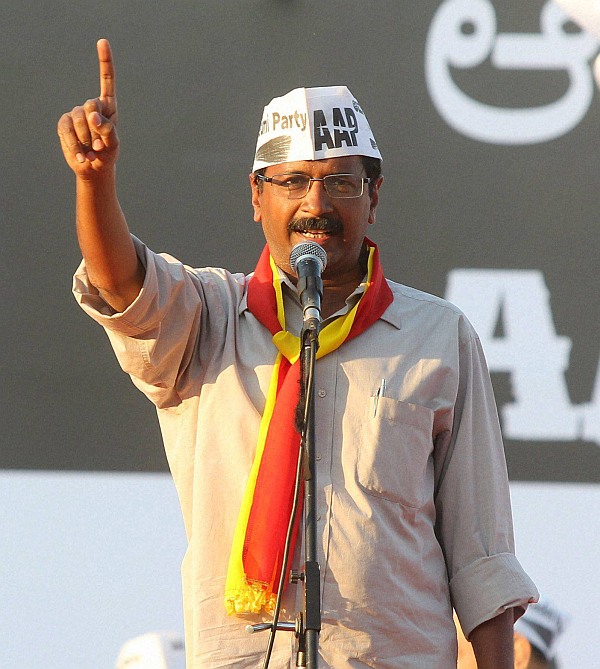
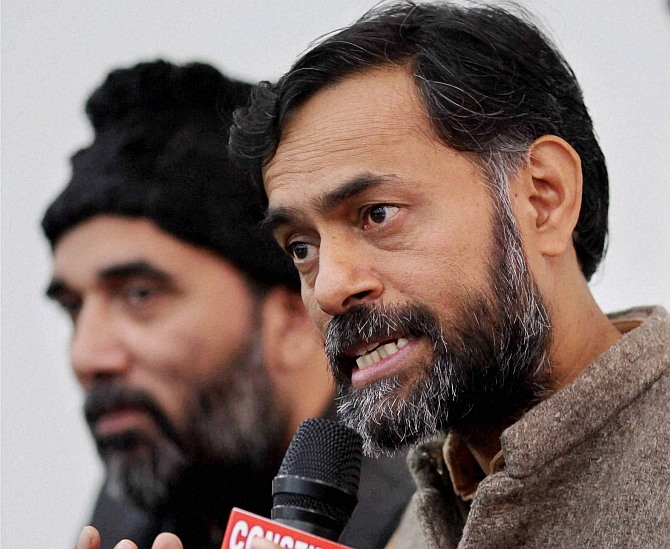
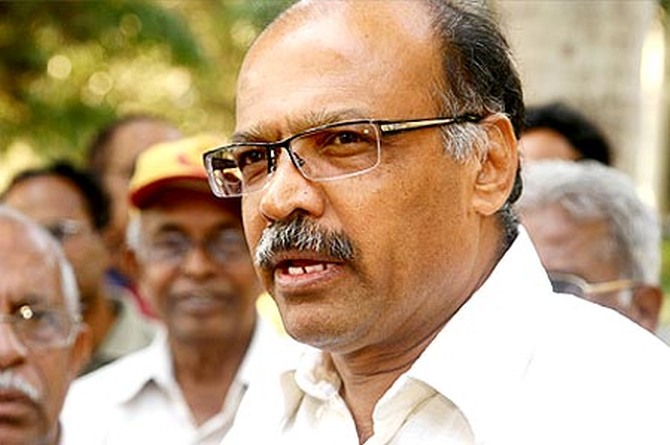
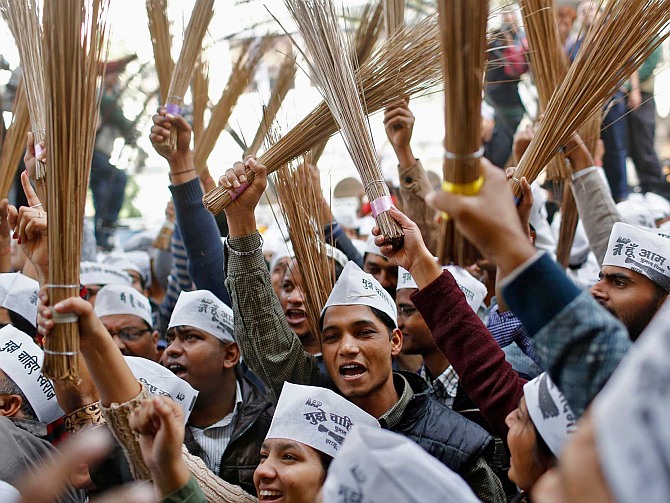
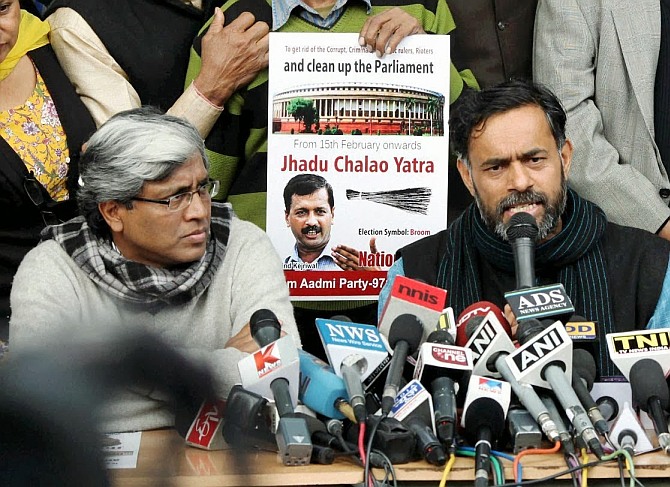
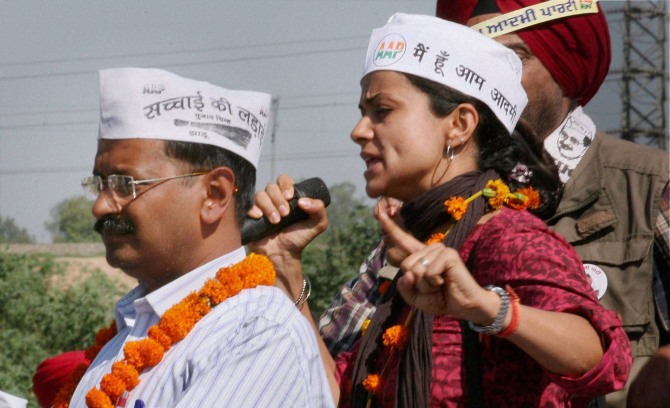

article